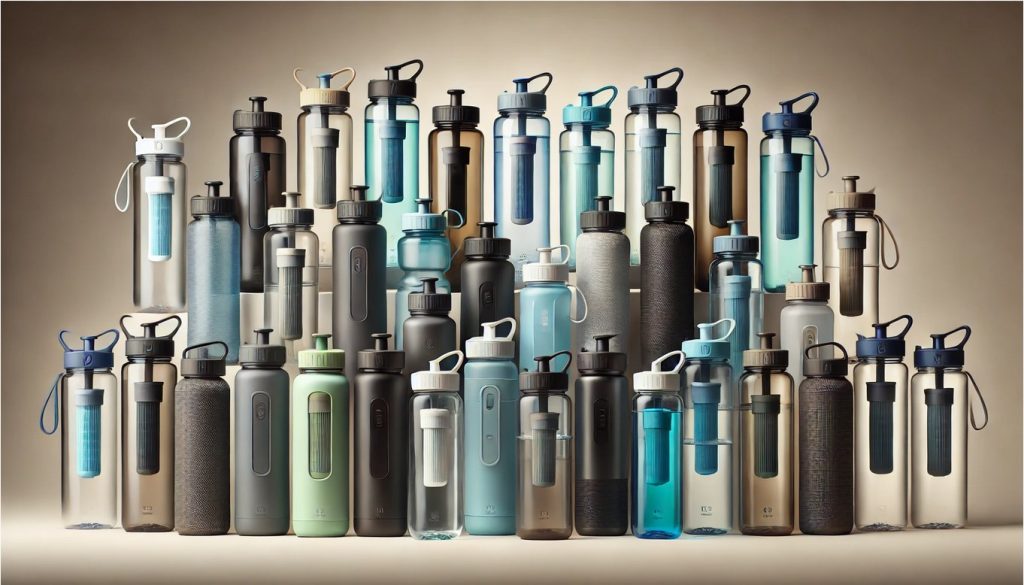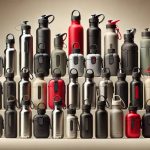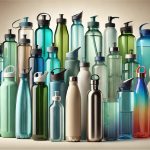Having access to clean and safe drinking water is essential, whether you’re traveling, hiking, or simply out and about in your daily life. However, when you’re on the go, finding a reliable source of safe drinking water can be a challenge. Portable filtered water bottles have become a solution for many, providing a convenient way to filter and purify water from natural sources or public taps, ensuring that you can hydrate safely wherever you are.
What Are Portable Filtered Water Bottles?
Portable filtered water bottles are specially designed containers that allow you to filter water while you’re on the move. These bottles come equipped with built-in filters that can remove contaminants such as bacteria, viruses, sediment, chlorine, heavy metals, and other impurities from water. They offer a convenient way to obtain clean drinking water from natural sources such as streams, rivers, or even tap water, making them an essential tool for outdoor adventurers, travelers, and individuals seeking a reliable source of safe hydration on the go.
How Do Portable Filtered Water Bottles Work?
Portable filtered water bottles typically work using a built-in filtration system that actively removes impurities as water passes through it. Depending on the type of filter, the bottle may filter out large particles, chemicals, and microorganisms from the water to ensure it is safe for drinking.
- Pre-Filters and Mesh Screens: Some bottles use mesh screens or pre-filters to remove large particles and debris from the water before it reaches the main filter.
- Activated Carbon Filters: Many portable water bottles contain activated carbon filters that absorb chemicals, chlorine, and bad odors to improve the taste and quality of the water.
- UV or Hollow Fiber Filters: Some advanced bottles use ultraviolet (UV) light or hollow fiber filters to kill bacteria, viruses, and protozoa, ensuring that the water is microbiologically safe to drink.
- Multi-Stage Filtration: Many high-end bottles feature multi-stage filtration systems that combine several methods for thorough purification, ensuring that the water is clean, safe, and tastes fresh.
Types of Portable Filtered Water Bottles
There are several different types of portable filtered water bottles available on the market, each designed for specific purposes and filtration methods. Understanding the different types will help you make an informed decision about which bottle best suits your needs.
Activated Carbon Filter Bottles
Activated carbon filter bottles are one of the most common and affordable options for portable water filtration. These bottles use activated carbon to remove chlorine, bad odors, and certain chemicals from the water, significantly improving the taste and quality.
Features of Activated Carbon Filter Bottles
- Improves Taste: The activated carbon absorbs chemicals and odors, making the water taste fresher and cleaner.
- Removes Chlorine and Chemicals: Carbon filters are excellent at removing chlorine, pesticides, herbicides, and some heavy metals, making the water more suitable for drinking.
- Affordable: Activated carbon filter bottles are generally more affordable compared to advanced filtration options like UV or multi-stage filters.
Common Uses of Activated Carbon Filter Bottles
- Traveling: These bottles are great for travelers who need to drink water from various sources, including public taps or questionable water sources.
- Camping and Hiking: Ideal for outdoor adventures where water sources may be uncertain or contaminated with chemicals or pollutants.
- Everyday Use: For individuals in urban areas who want to improve the taste and quality of tap water without relying on bottled water.
Hollow Fiber Filter Bottles
Hollow fiber filter bottles use a filtration method based on tiny fibers that are designed to trap bacteria, protozoa, and other microorganisms while allowing clean water to pass through. These filters are particularly effective for removing harmful microorganisms and pathogens, making the water microbiologically safe to drink.
Features of Hollow Fiber Filter Bottles
- Microbiological Purification: Hollow fiber filters can remove harmful bacteria and protozoa, including Giardia and Cryptosporidium, ensuring that the water is safe from pathogens.
- Lightweight: These filters are typically lightweight and compact, making them ideal for outdoor adventures.
- High Flow Rate: Hollow fiber filters typically have a higher flow rate than other filtration methods, allowing you to filter water quickly and efficiently.
Common Uses of Hollow Fiber Filter Bottles
- Backpacking and Hiking: Perfect for outdoor enthusiasts who need to purify water from streams, rivers, or lakes while hiking or backpacking.
- Survival Situations: Ideal for emergency situations where access to clean drinking water is limited.
- Trekking: Great for those who need to stay hydrated while trekking through remote areas where natural water sources may be contaminated.
UV-C Sterilization Filter Bottles
UV-C sterilization filter bottles use ultraviolet light to kill harmful bacteria, viruses, and other pathogens in the water. UV sterilization is a proven method of water purification that is quick and effective, providing a high level of microbiological safety.
Features of UV-C Sterilization Filter Bottles
- Effective Against Microorganisms: UV-C light destroys the DNA of microorganisms, ensuring that harmful bacteria and viruses are killed.
- Fast Purification: UV sterilization works quickly and efficiently, providing purified water in a matter of minutes.
- No Need for Chemical Additives: Unlike chemical treatments such as iodine or chlorine tablets, UV-C sterilization does not leave any aftertaste or residue in the water.
Common Uses of UV-C Sterilization Filter Bottles
- International Travel: UV-C filter bottles are ideal for travelers who may encounter contaminated water while visiting countries with poor sanitation.
- Hiking and Camping: Perfect for outdoor enthusiasts who want to ensure the water they drink from natural sources is free from harmful pathogens.
- Emergency Preparedness: UV-C sterilization bottles are great for use in emergency kits, where access to clean drinking water may be limited.
Multi-Stage Filter Bottles
Multi-stage filter bottles combine different filtration methods to provide comprehensive water purification. These bottles often use a combination of activated carbon, hollow fiber, and UV sterilization to remove a wide range of contaminants, ensuring the water is safe, clean, and free of harmful chemicals, bacteria, and viruses.
Features of Multi-Stage Filter Bottles
- Thorough Filtration: Multi-stage filters can remove a wide range of contaminants, including bacteria, viruses, heavy metals, chlorine, pesticides, and organic chemicals.
- Comprehensive Water Purification: These bottles typically use multiple filter stages, providing a higher level of filtration compared to single-method filters.
- Versatility: Multi-stage filter bottles are ideal for various types of water sources, including tap water, streams, lakes, and rivers.
Common Uses of Multi-Stage Filter Bottles
- Outdoor Adventures: Perfect for camping, backpacking, and hiking trips where access to clean water is not guaranteed, and a comprehensive filtration system is needed.
- Travel: Ideal for travelers who want a reliable bottle that can purify water from different sources, including questionable tap water or natural water sources.
- Emergency Situations: Multi-stage filters are great for emergency preparedness kits, where reliable water purification is essential.
Materials Used in Portable Filtered Water Bottles
The materials used in the construction of portable filtered water bottles are important not only for durability and performance but also for safety and ease of use. Below are some of the most commonly used materials in filtered water bottles.
Stainless Steel
Stainless steel is a popular material for portable filtered water bottles due to its durability, resistance to rust, and non-reactive properties. Stainless steel bottles are often used in combination with multi-stage filtration systems to ensure clean, safe, and well-maintained water.
Benefits of Stainless Steel Bottles
- Durability: Stainless steel is highly resistant to corrosion, rust, and scratches, making it a long-lasting option for outdoor use.
- Temperature Control: Many stainless steel bottles come with double-wall insulation, which helps keep drinks cold or hot for extended periods.
- Non-Toxic: Stainless steel does not leach harmful chemicals into the water, ensuring safe hydration.
Considerations
- Weight: Stainless steel bottles tend to be heavier than plastic alternatives, which could be a factor to consider for lightweight travel.
- Cost: Stainless steel bottles are often more expensive than plastic options but offer enhanced durability and insulation.
BPA-Free Plastic
BPA-free plastic is a lightweight, durable material that is commonly used in portable filtered water bottles. BPA-free plastics are free from harmful chemicals such as Bisphenol A, ensuring that the water stored in the bottle remains safe for consumption.
Benefits of BPA-Free Plastic Bottles
- Lightweight: Plastic bottles are much lighter than stainless steel and glass, making them more portable for long hikes or travel.
- Affordable: BPA-free plastic bottles are often more budget-friendly than stainless steel or glass alternatives.
- Impact Resistant: Plastic bottles are less likely to crack or break if dropped compared to glass.
Considerations
- Environmental Impact: While BPA-free plastic is safer than traditional plastic, it is still a petroleum-based material and may have a higher environmental impact compared to stainless steel or glass.
- Wear and Tear: Plastic bottles can become scratched or damaged over time, which may affect the taste and quality of the water.
Glass
Glass bottles are less common for portable filtered water bottles but are favored by individuals looking for a non-toxic, chemical-free option. Glass bottles offer the advantage of purity and taste but can be fragile compared to other materials.
Benefits of Glass Bottles
- Non-Toxic: Glass is free from harmful chemicals, making it one of the safest materials for storing water.
- Taste Preservation: Glass does not absorb odors or flavors, ensuring that your water tastes clean and fresh.
- Eco-Friendly: Glass is 100% recyclable and can be reused indefinitely without degrading in quality.
Considerations
- Weight: Glass bottles are heavier than plastic or stainless steel alternatives, which can be cumbersome for outdoor use.
- Fragility: Glass bottles are prone to breaking if dropped, making them less ideal for rugged environments.
Factors to Consider When Choosing a Portable Filtered Water Bottle
When selecting the right portable filtered water bottle for your needs, several factors should be taken into account to ensure that the bottle performs well, is easy to use, and suits your lifestyle.
Filtration Needs
The type of filtration system in the bottle is one of the most important factors to consider. If you’re primarily concerned about removing chemicals, chlorine, and improving taste, an activated carbon filter will suffice. For removing harmful microorganisms like bacteria and viruses, a hollow fiber filter or UV sterilization is ideal. If you need comprehensive purification for various water sources, a multi-stage filter system is the best choice.
Size and Capacity
The size of the bottle depends on how much water you need to carry and how long you’ll be away from a water source. For day trips, a smaller bottle (500 ml to 750 ml) may suffice, while longer hikes or camping trips might require larger bottles (1 liter or more).
Portability
Consider how portable the bottle is, especially if you plan on carrying it for long periods. Plastic bottles are lighter and more portable than stainless steel or glass, while collapsible bottles offer space-saving options for minimalists.
Durability
The durability of the bottle is another key consideration. Stainless steel bottles tend to be the most durable, followed by plastic options, with glass being the least durable. Choose a bottle that can withstand the rigors of outdoor use, especially if you’ll be exposing it to drops or impacts.
Ease of Cleaning
A clean bottle is essential for maintaining water quality, so look for bottles that are easy to clean. Wide-mouth bottles are typically easier to wash by hand, and some bottles are dishwasher safe for added convenience.
Cost
The price of portable filtered water bottles can vary depending on the materials used and the filtration system included. Stainless steel and multi-stage filter systems tend to be more expensive, while plastic options are often more affordable. Consider your budget and weigh the cost against the benefits of the bottle’s durability, performance, and features.
Environmental Impact
Consider the environmental impact of your water bottle choice. Stainless steel and glass are more sustainable options, as they are durable and recyclable. BPA-free plastic, while a safer alternative to traditional plastics, still contributes to plastic pollution. Choose a bottle that aligns with your values in terms of sustainability and reducing environmental waste.
Aesthetic Design
While functionality is key, aesthetics can also play a role in your decision-making. Portable filtered water bottles come in a variety of designs, colors, and sizes. Choose a bottle that appeals to your personal style, whether that means a sleek, minimalist design or a more colorful, vibrant option.







